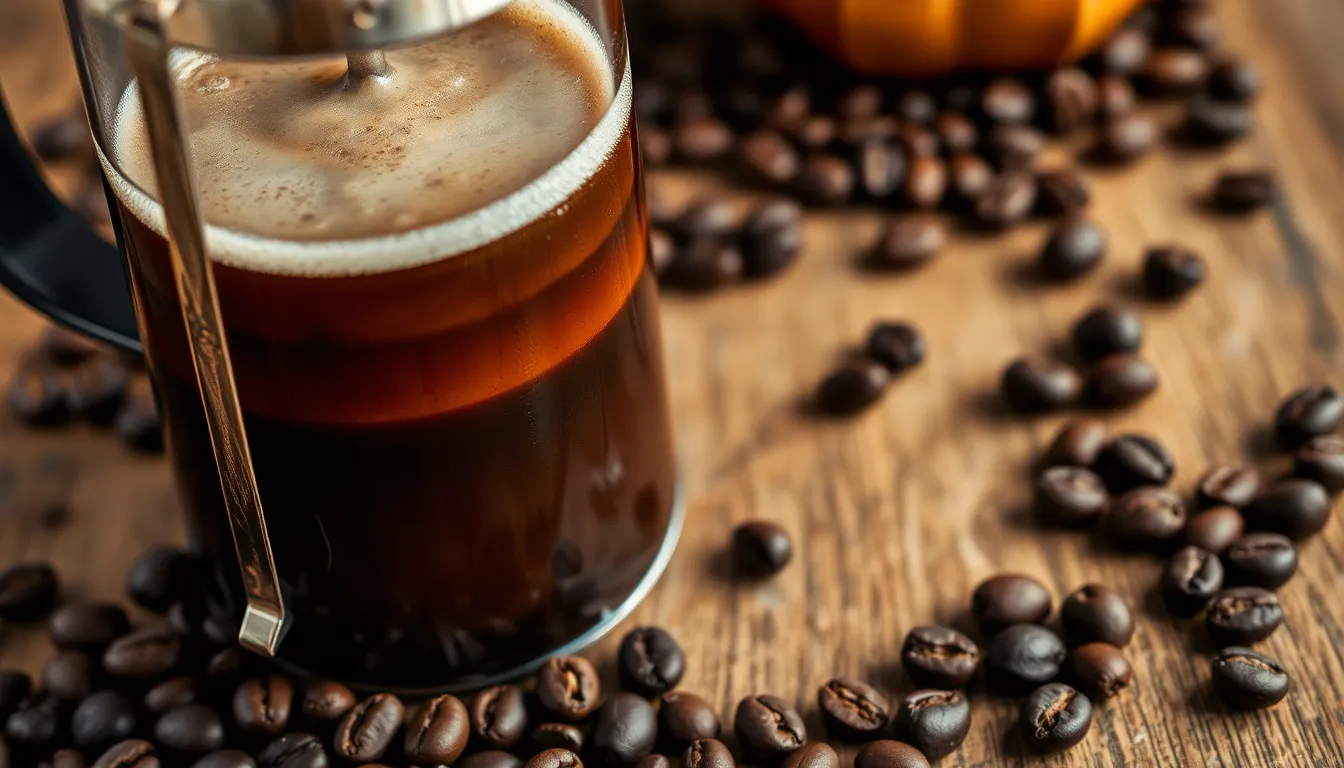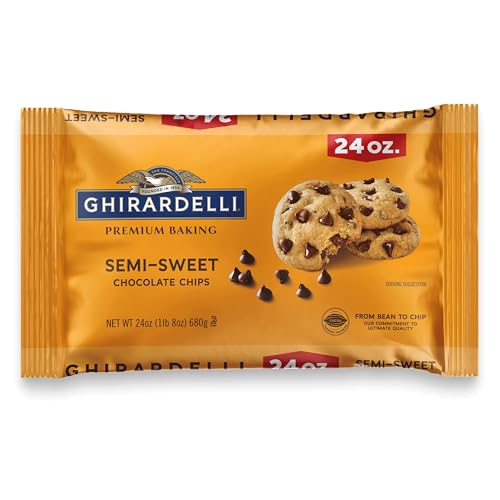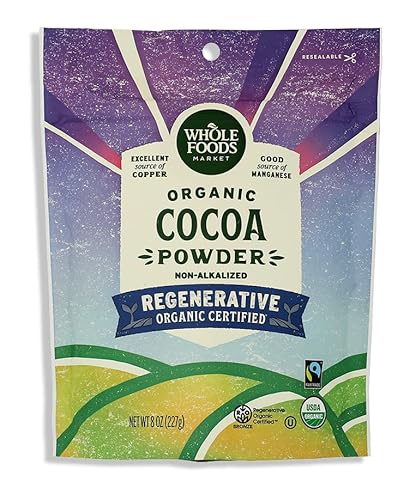Slow Cooker Recipes: Easy Meals, Less Effort!
Family-friendly dishes for busy people — quick prep, delicious results.
Grab yours for $4Wondering what coffee beans are best for French press brewing? You’re about to discover the perfect beans that’ll transform your morning ritual into a rich, flavorful experience worth savoring.
When it comes to French press coffee, the bean selection makes all the difference. The immersion brewing method extracts oils and flavors that paper filters typically trap, making medium to dark roasts with low acidity and bold profiles ideal choices. Unlike drip coffee makers, your French press will highlight every nuance of the bean—from origin characteristics to roasting techniques—creating a full-bodied cup that showcases the coffee’s true personality.
Understanding the French Press Brewing Method
The French press brewing method creates a rich, full-bodied coffee through a simple immersion process. This classic technique involves steeping coarsely ground coffee beans directly in hot water, then separating the grounds from the liquid using a metal mesh plunger. Unlike paper filter methods, French press brewing retains essential oils and fine particles that contribute to a robust flavor profile and creamy mouthfeel.
Water temperature plays a crucial role in French press brewing success. The ideal temperature range falls between 195-205°F (90-96°C), hot enough to extract flavors effectively without scorching the grounds. Many coffee enthusiasts use a temperature-controlled kettle to achieve precision, though bringing water to a boil and letting it rest for 30 seconds works well too.
Brewing time for French press typically ranges from 3-5 minutes depending on your taste preferences. Shorter steeping periods produce lighter bodies with brighter acidity, while longer extractions develop deeper, more intense flavors. The direct contact between water and grounds throughout the brewing process extracts soluble compounds that paper filters typically trap, resulting in a distinctly different cup compared to pour-over or drip methods.
“I’ve found that using a timer has completely transformed my French press experience,” shares Rikki Manny. “Four minutes seems to be the sweet spot for my favorite Ethiopian beans, bringing out those fruity notes while maintaining a velvety texture.”
The coarse grind size requirement distinguishes French press from other brewing methods. Fine grounds lead to over-extraction and sediment in your cup, while overly coarse grounds result in weak, under-extracted coffee. The ideal consistency resembles sea salt or raw sugar – uniform pieces large enough to be caught by the metal filter but small enough to release their flavors effectively during steeping.
When selecting coffee beans for French press brewing, consider how this method highlights exact characteristics in different bean varieties. The immersion technique emphasizes body and mouthfeel while showcasing origin-exact flavor notes that might be subdued in other brewing methods.
Key Characteristics of Ideal French Press Coffee Beans
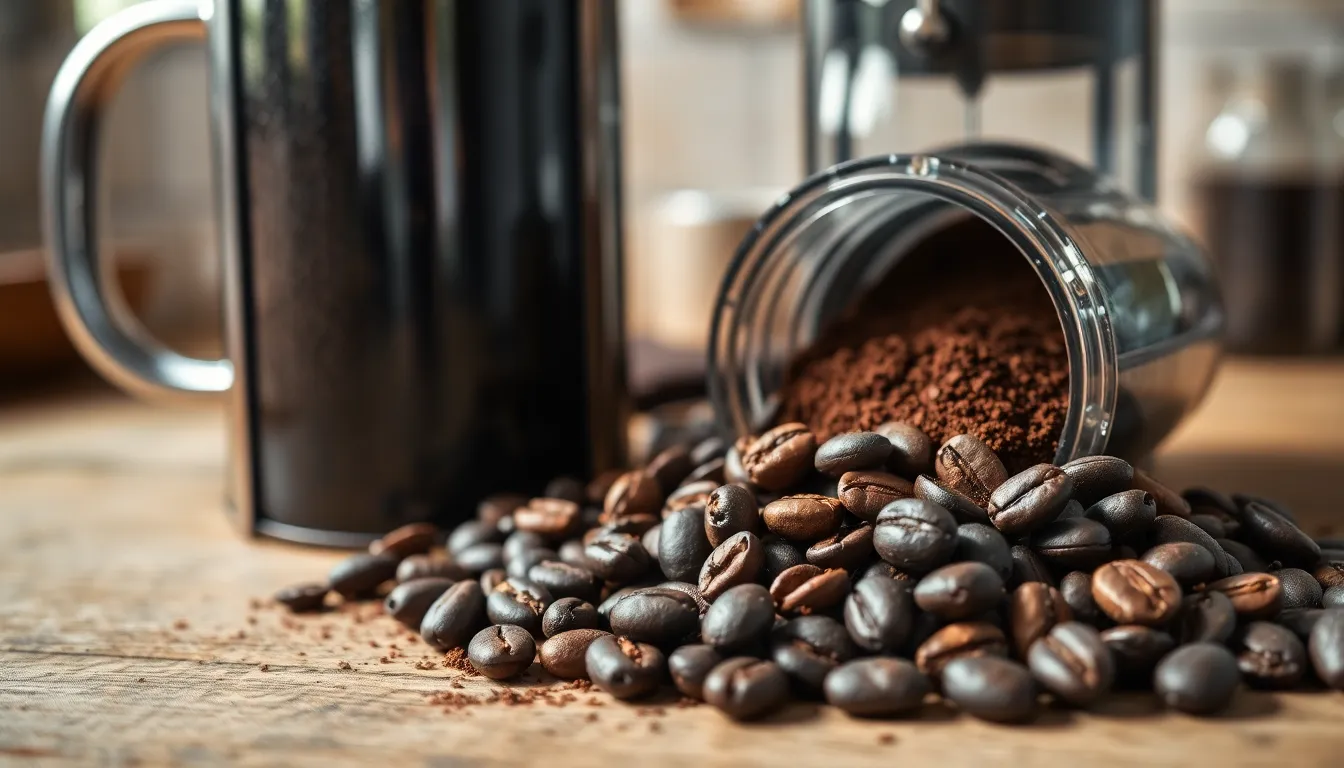
French press brewing extracts rich flavors that showcase the unique characteristics of your coffee beans. The right beans make all the difference in creating that perfect cup with depth and complexity that French press lovers crave.
Coarse Grind Size Requirements
French press brewing specifically requires a coarse grind to achieve optimal results. This larger particle size prevents over-extraction during the 4-7 minute steeping process, allowing water to extract flavors evenly without producing excessive bitterness. Coarse grounds also minimize sediment in your final cup, reducing that muddy texture that can ruin the experience. The immersion method preserves coffee oils and complex flavors that might otherwise be lost with finer grinds, creating a clean yet robust cup with pronounced body and mouthfeel.
Flavor Profile Considerations
Medium to dark roast beans typically excel in French press brewing due to their rich, full-bodied characteristics. These roast levels complement the immersion method by highlighting nutty, chocolatey, or fruity flavor notes that emerge beautifully during steeping. Both 100% Arabica beans and Arabica-Robusta blends perform well depending on your preference—Arabica offers balanced flavors ideal for black coffee enthusiasts, while Robusta blends provide additional strength and caffeine content that pairs wonderfully with milk or sweeteners.
Specialty coffees like DaLat (100% Arabica) deliver smooth, aromatic, fruity profiles perfect for French press, while DaNang (50/50 Robusta-Arabica blend) provides a stronger experience suitable for milk-based drinks. Freshness matters significantly—beans roasted and packaged recently maintain their distinctive aromas and flavors, especially evident in premium options like Colipse Bali Blue Moon, a medium-dark roast known for its rich flavor profile and balanced acidity from sustainable farming practices.
Top Coffee Bean Origins for French Press
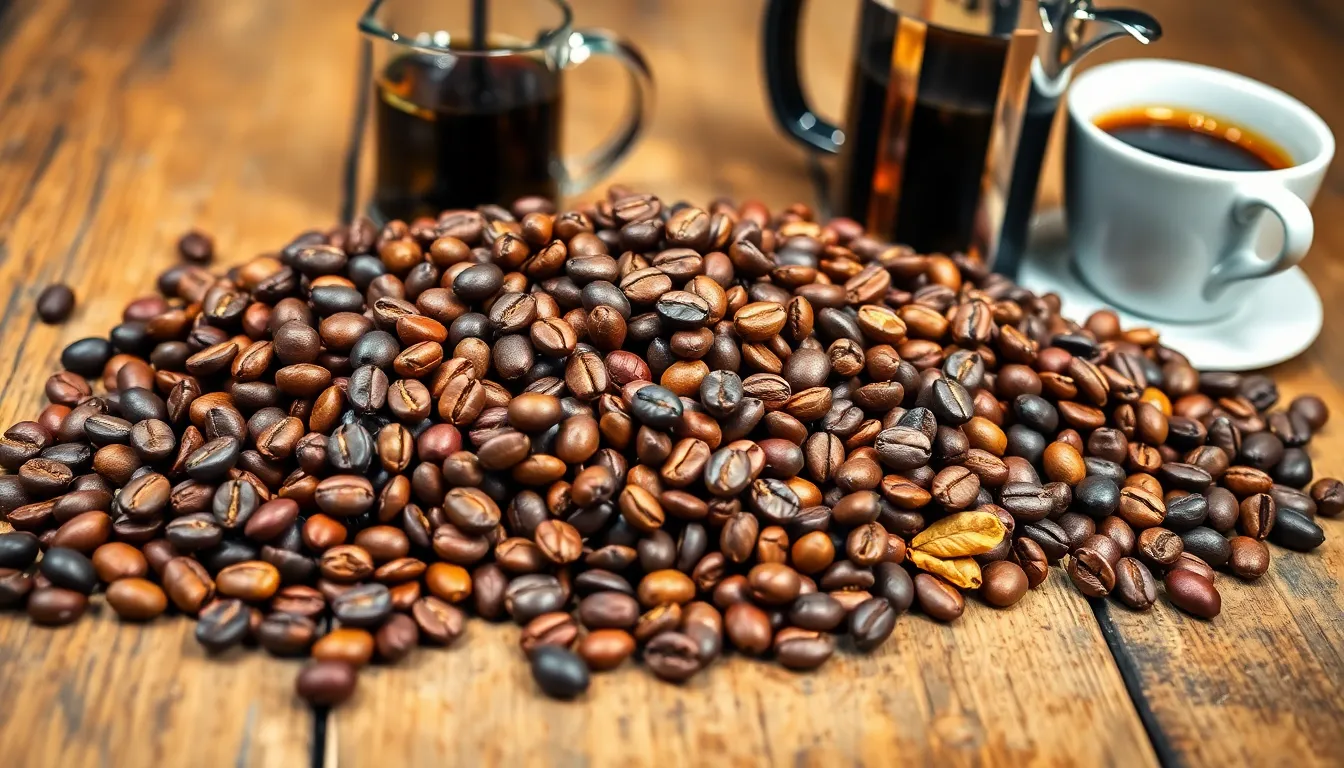
The origin of your coffee beans plays a crucial role in defining the flavor profile of your French press brew. Different growing regions impart distinctive characteristics that shine through this immersion brewing method, allowing you to experience the full range of flavors without paper filters to trap oils and compounds.
South American Selections
Colombian beans offer an exceptional French press experience with their balanced flavor profile and full-bodied nature. Their consistent quality produces a smooth, rich cup with pleasant acidity that complements rather than competes with the brewing method. Brazilian beans, meanwhile, feature delightful nutty and chocolate undertones that develop beautifully during the French press extraction process. These beans create a comforting, rich brew that many coffee enthusiasts find satisfying as a daily cup.
African Bean Options
Ethiopian beans bring complex, wine-like characteristics to your French press coffee, delivering vibrant fruity and floral notes that stand out brilliantly. The immersion method captures these distinctive qualities, resulting in cups with remarkable depth and brightness. Guatemalan beans contribute subtle spice notes and a medium body that works harmoniously with the French press technique. Their layered flavor profile adds complexity to your brew, creating an interesting cup that reveals different taste dimensions as it cools.
Indonesian and Pacific Choices
Indonesian beans feature earthy, woody, and sometimes spicy characteristics that the French press accentuates perfectly. These distinctive flavor notes create a bold, memorable cup that stands up well to longer extraction times. Pacific region coffees from Vietnam and other Southeast Asian countries often include robusta varieties that add important strength and caffeine content. These beans perform exceptionally well when you prefer your French press coffee with milk or sweeteners, as their robust profile cuts through admirably while maintaining flavor integrity.
Best Dark Roast Beans for French Press
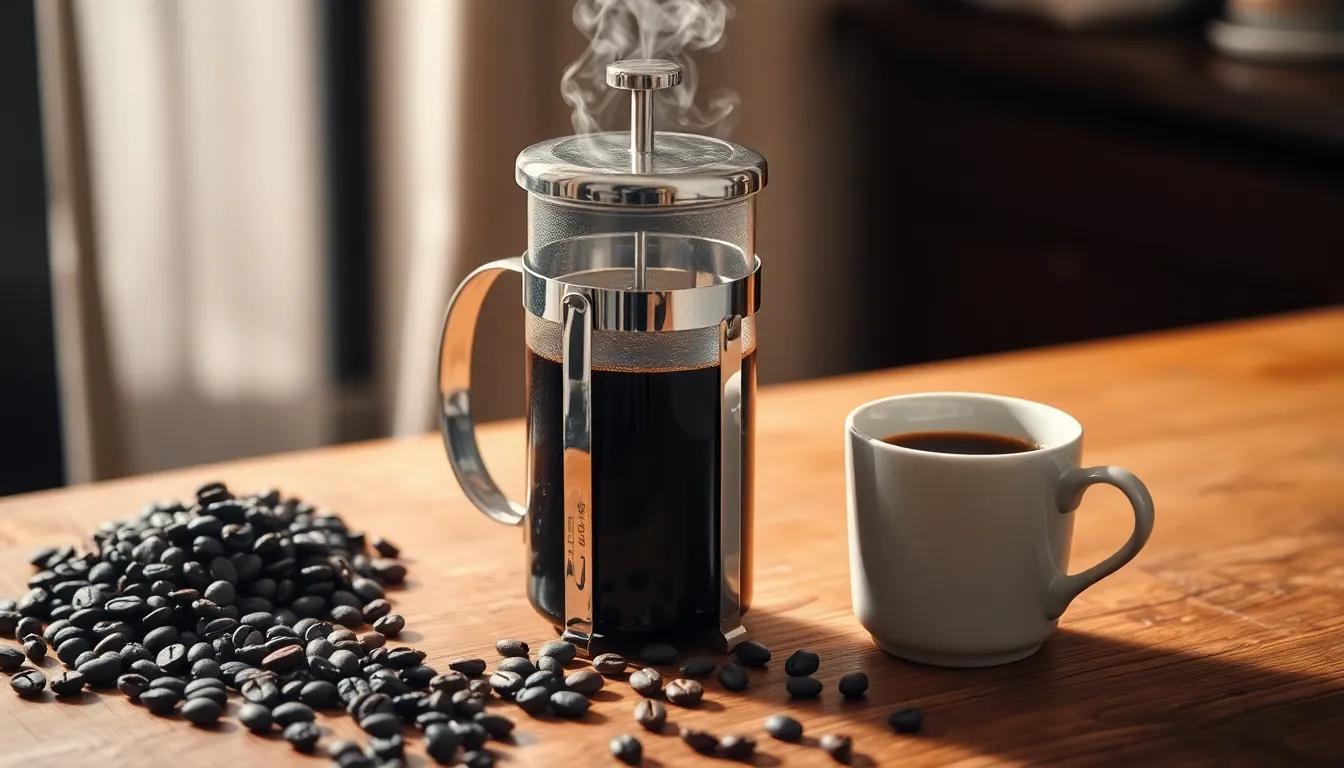
Dark roast coffee beans deliver rich, bold flavors that complement the French press brewing method perfectly. These beans undergo longer roasting times, bringing oils to the surface and developing deeper, more intense flavor profiles with reduced acidity. French press extraction captures these oils and complex flavors because it doesn’t use paper filters that would otherwise trap them.
Top Dark Roast Recommendations
Kicking Horse Coffee Kick Ass offers a smoky, sweet profile with notes of chocolate malt, molasses, and licorice that shine through when brewed in a French press. The coarse grind requirement for French press brewing allows these complex flavors to develop fully during the steeping process.
Peet’s Major Dickason’s Blend combines Latin American, Pacific, and East African beans for a rich, complex cup with full body and minimal acidity. Its dark roast characteristics are enhanced by the French press’s ability to preserve natural oils.
Black Rifle Coffee Freedom Fuel Roast provides a robust flavor profile with earthy undertones and a smooth finish, making it an excellent choice for those who enjoy their French press coffee with pronounced strength.
Indonesian Dark Roasts
Indonesian dark roast beans, particularly from Sumatra and Java, deliver earthy, woody characteristics with a full body that’s ideal for French press brewing. These beans typically feature low acidity and deep, complex flavors that become more pronounced through the immersion brewing method.
Colipse Bali Blue Moon exemplifies the quality of Indonesian dark roasts. This medium-dark specialty coffee combines Red Bourbon and Typica varieties, grown organically and processed using the wet-hull method to reduce acidity while deepening flavor. The French press extraction method complements these characteristics by preserving the coffee’s natural oils and robust profile.
Blends vs. Single Origins
Dark roast blends often combine beans from different regions to create balanced flavor profiles with consistent results. Lavazza Rossa and Starbucks Pike Place represent popular dark roast blends that perform exceptionally well in a French press, offering reliable flavor profiles batch after batch.
Single-origin dark roasts provide unique tasting experiences that reflect their exact growing regions. These beans allow you to explore distinctive flavor notes that vary based on the bean’s origin, elevation, and processing method. The French press brewing technique highlights these unique characteristics by extracting all the flavor compounds present in the beans.
Freshness Considerations
Dark roast beans reach their peak flavor when used within 2-4 weeks of roasting. The freshness factor becomes particularly important with dark roasts because their oils can become rancid more quickly than lighter roasts. Buying beans in smaller quantities and grinding them just before brewing maximizes the flavor potential in your French press coffee.
Medium Roast Options for a Balanced Brew
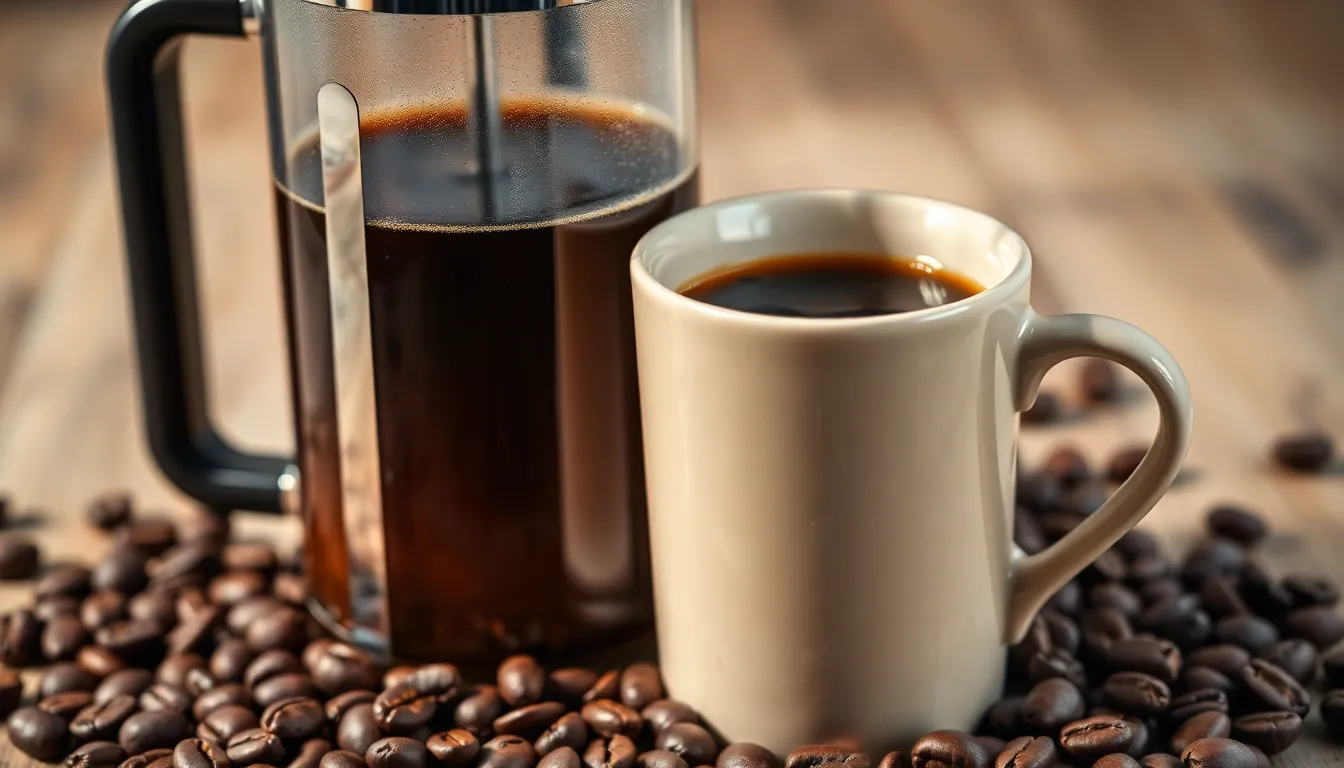
Medium roast coffee beans offer the perfect balance for French press brewing, combining bright acidity with rich body and complex flavors. These beans strike an ideal middle ground that complements the immersion brewing method exceptionally well. Colombian, Guatemalan, and Brazilian medium roasts stand out as premium choices due to their balanced profiles and clean sweetness that enhances the overall cup quality.
The flavor profile of medium roasts delivers smooth, well-rounded tastes with subtle notes of cocoa and toasted nuts, creating a creamy mouthfeel that French press brewing accentuates. Starbucks Pike Place exemplifies this profile perfectly—a 100% Arabica Latin American blend that costs around $18 for 16 ounces and offers chocolate undertones with nutty accents that shine through the metal filter of a French press.
Medium roasts maintain sufficient acidity to bring brightness to your cup while providing the richer body that works harmoniously with the French press’s full immersion technique. The brewing method extracts more oils and fine particles than other techniques, allowing medium roast characteristics to fully develop in the cup without overwhelming bitterness.
For optimal results, pair your medium roast beans with the appropriate brewing ratio—specialty roasters like Brewing Truth Coffee recommend a 1:16 coffee-to-water ratio with a 7-minute brew time for their medium roast specialty beans. Other excellent options include balanced blends like Neo Noir, which offers smoky, bold notes that complement the French press method’s full extraction capability.
The coarse grind size remains crucial even with medium roasts, preventing over-extraction while allowing the beans’ natural oils and flavors to infuse properly into your brew. Latin American origins particularly excel in this brewing style, delivering the perfect combination of flavor complexity, body, and brightness that makes medium roasts a top recommendation for French press enthusiasts.
Single-Origin vs. Blends for French Press
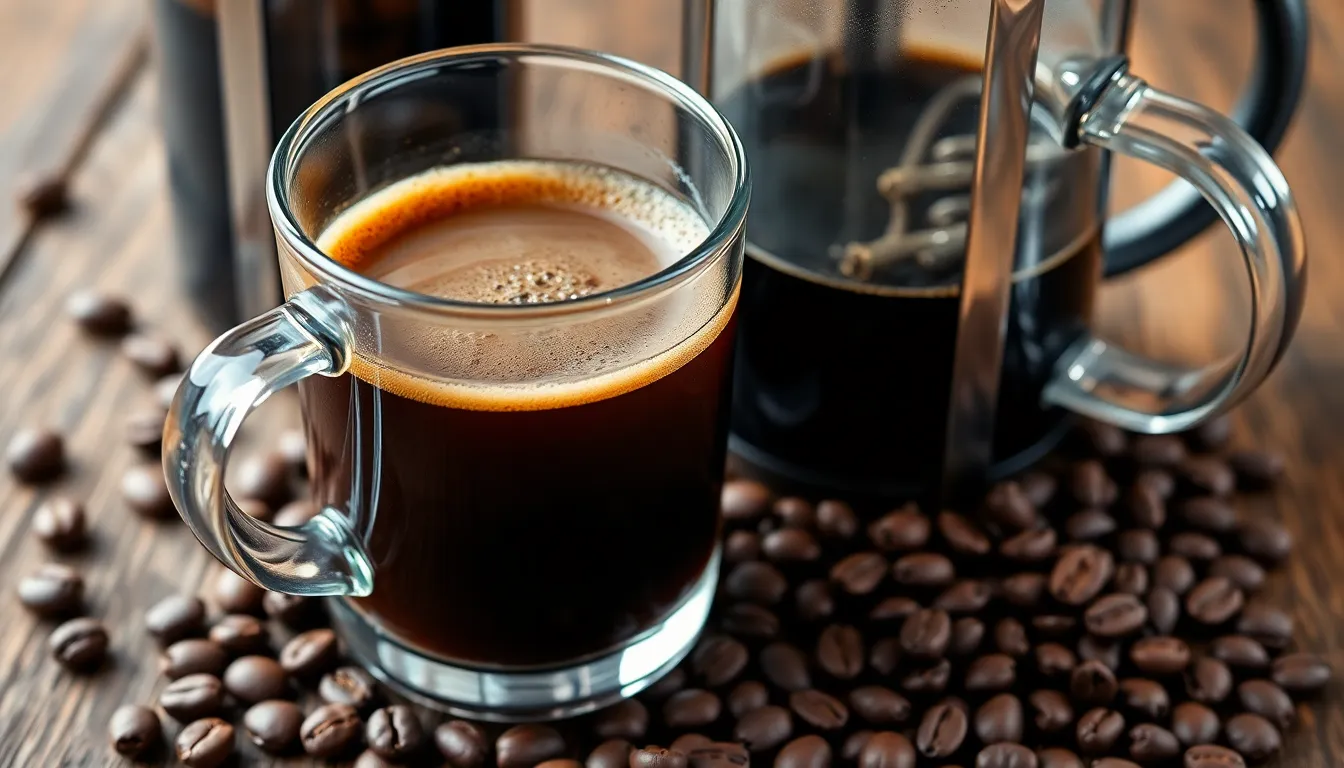
Single-origin beans showcase distinct regional flavors that truly shine when brewed in a French press. These 100% Arabica beans deliver nuanced, complex profiles that reflect their exact growing regions with remarkable clarity. DaLat beans exemplify this perfectly, offering smooth, aromatic, and fruity notes that the French press method highlights beautifully without paper filters to trap these subtle flavors.
Blends present an alternative approach that many French press enthusiasts prefer. Arabica-Robusta combinations, such as the DaNang blend (50% Robusta / 50% Arabica), deliver stronger, bolder cups with increased caffeine content. These blends particularly appeal to coffee drinkers who add milk or sweeteners, as the robust flavors remain prominent even when diluted. Many specialty coffee shops create custom blends specifically designed to perform optimally in immersion brewing methods.
The choice between single-origin and blends eventually depends on your flavor preferences:
- Single-origin beans work best for those who enjoy drinking their coffee black and appreciating complex flavor notes
- Blends provide more consistent flavor profiles across different batches
- Medium to dark roast levels complement both options in a French press
- Coarse grind remains essential regardless of bean selection to prevent over-extraction
| Feature | Single-Origin Beans | Blends (Arabica-Robusta) |
|---|---|---|
| Flavor Profile | Complex, region-exact | Balanced, stronger, higher caffeine |
| Roast Preference | Medium to dark | Medium to dark |
| Best For | Black coffee drinkers | Those adding milk/sweeteners |
| Example | DaLat (100% Arabica) | DaNang (50/50 Robusta-Arabica) |
Specialty-grade, freshly roasted beans elevate either choice for French press brewing. Premium options like Bali Blue Moon (medium-dark roast) demonstrate how sustainable farming practices contribute to exceptional cup quality. Commercial options such as Peet’s Major Dickason’s Blend or Starbucks Pike Place provide reliable quality for those seeking more accessible alternatives.
French press brewing accommodates various origins and varietals effectively, making it an ideal method for exploring different bean types. The immersion technique extracts oils and flavors that paper filters typically remove, allowing you to experience the full range of characteristics from either single-origin beans or thoughtfully crafted blends.
How to Store Your French Press Coffee Beans
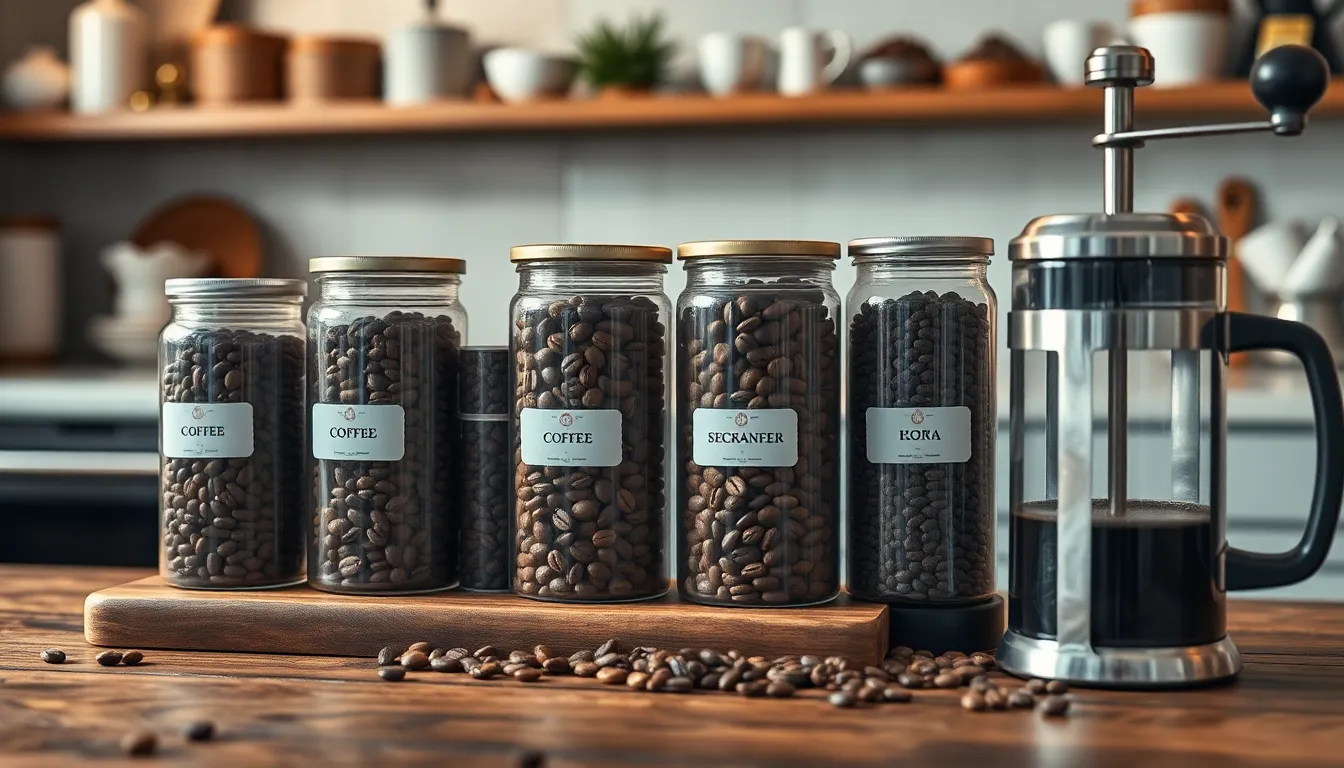
Proper storage maintains the freshness and flavor of your French press coffee beans. Whole bean coffee begins to lose its aroma and taste quickly when exposed to oxygen through a process called oxidation. To preserve quality, always store your beans in an airtight container placed in a cool, dark location away from moisture, heat, and direct light.
Buying whole beans rather than pre-ground coffee offers important advantages for French press brewing. Grinding just before brewing ensures maximum flavor extraction and prevents the rapid deterioration that affects pre-ground coffee. A quality burr grinder allows you to achieve the consistent coarse grind necessary for optimal French press results.
Coffee beans typically maintain peak freshness for 2-4 weeks after roasting when stored properly. Airtight ceramic or opaque glass containers with one-way valves provide ideal storage conditions by allowing carbon dioxide to escape while preventing oxygen from entering. Common storage mistakes include keeping beans in the refrigerator, where they can absorb moisture and odors, or leaving them in their original packaging, which rarely offers adequate protection against air exposure.
The extra effort of proper storage pays off in your cup. Well-preserved beans deliver richer flavors, more pronounced aromatic qualities, and better overall extraction during the immersion brewing process that makes French press coffee so distinctive.
Conclusion
Choosing the right coffee beans for your French press is about finding what excites your taste buds while respecting the brewing method’s strengths. Medium to dark roasts typically shine brightest with their rich body and pronounced flavors that the mesh filter beautifully preserves.
Whether you opt for single-origin beans to experience distinct regional characteristics or blends for a more consistent profile you’ll enhance your morning ritual with thoughtful selection. Remember that freshness matters tremendously so store your beans properly and grind just before brewing.
With the right beans coarsely ground the French press reveals coffee’s true depth and complexity. Trust your palate experiment with different origins and roast levels and you’ll discover your perfect cup.
Frequently Asked Questions
What are the best types of coffee beans for French press?
Medium to dark roast beans with low acidity and bold flavor profiles work best for French press brewing. These roasts highlight nutty, chocolatey, or fruity notes that shine through the immersion method. Both 100% Arabica beans and Arabica-Robusta blends perform well, with South American, African, and Indonesian origins each offering unique characteristics. Specialty coffees like DaLat and DaNang are excellent choices for their distinctive profiles.
Why is a coarse grind important for French press coffee?
A coarse grind is essential for French press brewing because it prevents over-extraction and excessive bitterness during the 4-7 minute steeping process. The larger particles also minimize sediment in your final cup, as they’re more effectively filtered by the metal mesh plunger. Using finely ground coffee would result in a muddy cup with gritty texture and potentially bitter flavor due to over-extraction.
What water temperature is best for French press brewing?
The ideal water temperature for French press brewing is between 195-205°F (90-96°C). This temperature range ensures optimal extraction of flavors and oils from the coffee beans without scalding them. Water that’s too hot can extract bitter compounds, while water that’s too cool will result in under-extraction and a weak, sour cup of coffee.
How long should I brew coffee in a French press?
The optimal brewing time for French press coffee is typically 3-5 minutes. Shorter steep times (around 3 minutes) yield lighter-bodied cups with brighter acidity, while longer times (4-5 minutes) produce deeper, more robust flavors with fuller body. Adjust according to your taste preferences, but avoid exceeding 7 minutes as this can lead to over-extraction and bitterness.
Are dark roast beans better than medium roast for French press?
Neither is definitively “better” – it depends on your preference. Dark roasts deliver rich, bold flavors with chocolatey, smoky notes that complement the French press method beautifully. Medium roasts offer more balanced cups with complex flavors and subtle brightness. Dark roasts work well with milk additions, while medium roasts often shine when consumed black. Both can produce exceptional French press coffee.
Should I choose single-origin beans or blends for French press?
Both can excel in a French press. Single-origin beans (like DaLat) showcase distinct regional characteristics and are ideal for black coffee enthusiasts seeking unique flavor profiles. Blends (like DaNang’s 50/50 Robusta/Arabica mix) provide consistent, balanced cups with broader appeal, especially if you add milk or sweeteners. Your choice should align with your flavor preferences and how you enjoy your coffee.
How should I store my coffee beans for French press brewing?
Store whole coffee beans in an airtight container in a cool, dark place away from moisture, heat, and light. Avoid refrigerating beans as they can absorb odors and condensation. For best results, buy freshly roasted beans and only grind what you need immediately before brewing. Properly stored beans maintain their flavor for 2-4 weeks after roasting, with dark roasts typically having a shorter peak freshness window.
What coffee-to-water ratio works best for French press?
A ratio of 1:16 (coffee to water) is generally recommended for French press brewing, which translates to about 1 tablespoon of coarsely ground coffee per 4 ounces of water. For a standard 32-ounce French press, use 8 tablespoons (about 56 grams) of coffee. Adjust this ratio to your taste preferences – use more coffee for a stronger brew or less for a milder cup.
Can I use light roast beans in a French press?
Yes, you can use light roast beans in a French press, though they’re not traditionally recommended. Light roasts typically have higher acidity and more delicate flavor notes that may not shine through the immersion method as effectively as medium or dark roasts. If using light roasts, consider a slightly longer brew time (4-5 minutes) and ensure your grind is consistently coarse to extract their unique characteristics.
How do bean origins affect French press coffee flavor?
Bean origin significantly impacts flavor profiles in French press brewing. South American beans (Colombian, Brazilian) offer balanced, nutty, chocolatey notes. African beans (Ethiopian, Kenyan) provide complex, fruity, and floral characteristics. Central American beans add subtle spice notes with medium body. Indonesian beans contribute earthy, woody flavors with low acidity. Pacific region coffees, including some robustas, deliver strength and bold flavors ideal for milk additions.

